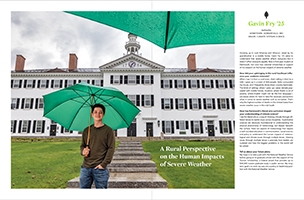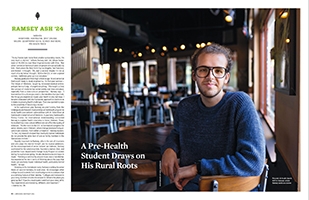Virtual Campus Tour
Explore our campus with our tour guides Emil '25, Mariya '25, Michaela '25, and Simon '24.
Explore our campus with our tour guides Emil '25, Mariya '25, Michaela '25, and Simon '24.
Dartmouth has a longstanding commitment to educating the most promising students worldwide, regardless of their location, background or financial means. Rural students have long enriched the College's diverse undergraduate student body with their important lived experiences and perspectives.
Dartmouth is excited to contribute to and engage with the resources and guidance of the STARS (Small Town and Rural Students) College Network and continue to expand programming, outreach, and communication that supports students and families from rural communities in navigating the college search.
Dartmouth acknowledges that there are many ways to define what "rural" means. Here are a few examples below as a helpful starting point, but ultimately it is up to each student to define their own lived experience in telling their story.
Dartmouth reviews applications without regard for your family's ability to pay for your education and meets 100% of demonstrated financial need for all four years.
Schoolhouse.world and Khan Academy are partnering together with the STARS Network to spearhead an initiative to prepare small town and rural students for college-level mathematics courses at some of the nation's most well-known colleges and universities. Students are welcome to submit schoolhouse.world certification to their application. Once you've completed certification in a specific subject area, you'll be able to download a PDF document from Schoolhouse.world verifying your completion. You can then upload this PDF through your application portal as supplemental materials.
"Let's talk about rural. For many students in the United States and around the world, that upbringing is the defining element of who they are. As they look towards college, it should be an indelible front-and-center part of the story the student tells by way of the narrative that informs the application."
— Lee Coffin, Vice President and Dean of Admissions and Financial Aid
On the Admissions Beat, veteran dean of admissions Lee Coffin from Dartmouth College and a range of guests provide high school students and parents, as well as their counselors and other mentors, with "news you can use" at each step on the pathway to college. In the following episodes, he and his guests examine the ways students from rural backgrounds told their authentic stories through their college application process.

Growing up in rural Arkansas and Missouri, raised by his grandmother in a mobile home, Gavin Fry '25 came to understand that severe weather affects everyone—but it doesn't affect everyone equally. Now a third-year student at Dartmouth, he's won two national scholarships in support of his research on the human impacts of extreme weather. Read more about his Dartmouth experience.

Drawing on his hometown roots, Ramsey Ash '24 is writing his senior thesis on vaccine hesitancy in rural areas. He encourages other college-bound students from rural backgrounds to embrace that as a defining feature of their identity. "Colleges are interested in your story, and that includes the answer to 'What is the place you grew up like?' If you're a rural student and that's your story, tell it. Your experiences are interesting, different, and important." Read more about Ramsey's Dartmouth experience.
Hello, as I start my blogging journey I encourage you to learn about my background. I talk about my family, athletics, home life, schooling, and spirituality. This is only a snapshot, there is more to come!
Hi, my name is Lauren! In this post, I'll introduce myself and share why I chose to become a Dartmouth '27.
I'm here to tell you about Dartmouth... but who am I? As I start my journey at the College (and as a People Places Pines blogger), get to know a little bit more about me and what interests me!
Coming from a rural background, I believe it's crucial to factor in the geographic location and livability of your future college town.
Inhale the clean scent of nature and observe the flamboyant fall foliage of Hanover as I welcome you to my neck of the woods! My name is Brendilou, a member of Dartmouth's Class of '26, and this is my first blog post! Let's get to know each other.
